
How Do We Feel About An August World Juniors?
The news from the IIHF is intriguing, but what are the ramifications of the tournament? Our prospect expert dives in.

The international scene got some fascinating news today as the IIHF announced the rescheduling of the 2022 World Junior Championship, which had been cancelled/postponed after a few days due to Covid outbreaks (the infamous 'Red Deer Wedding' tournament).
The plan now is to wipe the slate clean and start all over again in Alberta in August, likely right after the under-18 Hlinka-Gretzky Cup, a non-IIHF event that is heavily scouted by NHL teams and is slated to take place in Edmonton and Red Deer.
The news is still very fresh, but it opens up an interesting conversation about what this summer world juniors will look like. According to the IIHF, it will still be for players born in 2002 and beyond - so no one who played in December will be pushed out. But a lot has happened since that time and it's fair to wonder how many of the top stars will come back.
One NHL GM I spoke to acknowledged that franchises will be concerned with players getting fatigued or injured during a period that is usually pretty lax on the schedule, but he would want his prospects there.
"It has to be played, you need to determine a champion," he said. "And if you have a good tournament, you could even slingshot yourself into an NHL spot."
Having said that, imagine you are Shane Wright, the No. 1 prospect in the 2022 draft. You are, almost certainly, going straight from the draft to the NHL and possibly going to a rabid hockey market in Montreal. Do you want to risk getting hurt right before your first NHL camp?
The same could be said for Buffalo Sabres prospect Owen Power, who just finished a tour with Canada's Olympic team where he led the team in ice time by a considerable margin. Power has been a dominant college hockey player with the University of Michigan this season and probably could have played for the Sabres already. Heck, even if the Wolverines win the Frozen Four, Power could play for Buffalo this year; the Sabres still have regular season games on the schedule after that and he could realistically get into eight contests.
The same could be said for fellow Michigan stars Matty Beniers (Seattle) or Kent Johnson (Columbus), two other young Olympians. But the real test for the three Wolverines will be next fall when they could secure their first full-time NHL gigs (I am assuming all three leave school in this scenario - I can't say for sure they all will).
With the NHL draft taking place July 7th and 8th this summer in Montreal, I would expect most teams to hold their development camps a few days later, so there's no conflict with the world juniors there. Prospect tourneys such as Traverse City typically take place in early September, so we're good there, too. There's also the World Junior Summer Showcase that has been a great event in Michigan in recent years, but having the actual tournament in August probably impacts what that event/tryout camp looks like, too. Needless to say, there are a lot of unknowns surrounding the summer right now thanks to this news.
It's also worth wondering about how this impacts the 2023 world juniors in Russia. After all, how much different will the tournament be four months after the Alberta remix? Sure, you will get some roster turnover, but your Connor Bedards, Matvei Michkovs and Dalibor Dvorskys would likely play in both - not that I'm ever going to say no to watching those kids light up a rink.
And even though Alberta was a disaster in December, we cannot ignore the fact that Canada pumps serious dollars into the IIHF's coffers and you know you're going to sell tickets to the hockey-mad locals. I'm sure TSN, the world juniors broadcaster, will also appreciate the make-good for all the advertisers who spent serious coin with them in December just to watch it all go to pot.
Finally, I do appreciate that the August world juniors will have real stakes: According to the IIHF, the loser of the relegation round will indeed be sent down the table and replaced by Belarus for the 2023 edition in Russia. That means teams like Austria and Switzerland will have to be on point.
It's all very new and the hockey world is still digesting the news, but you gotta give it to the IIHF: they're never boring.